QuestionI have two 3-year-old male rats.
Both have within the past few weeks lost some movement in their back legs/feet. Upon doing some research, I have since limited their cage to one level, removed bedding and replaced with paper towel, as well as moved their water to the bottom level and put their food in a shallow dish.
They both seem to have dealt well with the limit in movement, trucking around their cage really well :)
In the past week, the more dominant of the two has shown other signs of illness. Suddenly his fur looks thin and although he has no actual bald patches...there are spots that are getting that way. He stays in their hide most of the time, although he does come halfway out to look through the food when I feed them. He's slower and...well, elderly in appearance...
Yesterday I noticed swelling on the right, lower side of his head (just at or below the jaw) and heard a sort of wet noise as he chewed (?...although I'm not sure if he was eating something or if the chewing motion was making the noise)....thoughts pls?
AnswerI am SOOOOOOOOOOOOOOO SORRY it took me so long to get to you!! I just was told by allexperts I had several unanswered questions sitting and I was like....whoa....I hate that, esp if its urgent!
Bless our elderly boys. I have four right now, two are two years old (as of October) and the other two are 3 and a half.
Right now, they are old, but not super old. Rats bodies are not made to survive after the age of two, and since Veterinary medicine has come a long way and are finally taking an interest in small mammals, they are getting better health care and the rat keeper in the mean time, has taken up educating themselves on rat care and rat ailments and diseases and treatments as much as possible, taking in info like a sponge in order to provide the best care possible. Rats and other small mammals do not have their own vets, not yet anyhow. Exotic vets are usually avian slash exotic certified but finally after years of pushing and years of rat owners and experts alike were begging to have better vet care and now, as of January 15,2009, vets can take continued education courses and become what will be known as
"Exotic Companion Mammal Practice" Its so exciting and the new specialty will focus on small mammals that include our ratties, ferrets, hamsters and gerbils, guinea pigs,rabbits, hedgehogs, chinchillas and other small mammals we keep as pets, even skunks in
states where they are legal (yes skunks and they make great pets believe it or not!!)
The first exam will be early November 2009, so this means we will start seeing this type of Vet pop up in our state at least within the next few years. meanwhile, there are exotic vets out there that are great with rats and some non exotic vets that are regular vets but have taken it upon themselves to study extra text books on exotics, but sadly they go by the basics and our rats get the minimal care.
That said, our rats are living longer....thus in turn, we are seeing their bodies suffer from degenerative changes, especially in the hind legs where there is sometimes considerable amounts of nerve endings, results in nerve root compression, which you may be seeing in your boys now, where it is not only more common in males than females, but it is usually seen earlier, around this age.
The wet noise as he chews could be from nasal congestion (think about when you have a cold and are chewing, it may be difficult to breathe if he is stuffed up from a possible respiratory infection) This is reason why rats that are sick with respiratory infection stop eating at times, because its difficult to chew and breathe at the same time. Baby food comes in hand at this point so they can lick and swallow.
I dont like the lump you see, which could be an abscess. Since so much time has elapsed can you tell me what is going on now?
Notice any odor?
How do his teeth look?
Hair loss comes from hormone changes, but it can also come from mites, over grooming can also cause hair loss as well, and last but not least, sometimes even heart disease can cause thinning of the rats hair. What else can you tell me about him....does he seem tired more?
You can read up on elderly rats on my site, although since you have already moved their cage to a single story, your on the right track.
Let me know how things are now and we can go from there.....

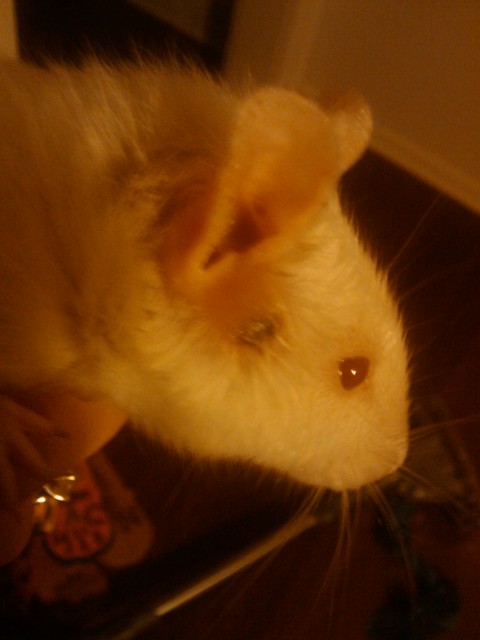 ear infection?
Question
QUESTION: I really appreciate your help
ear infection?
Question
QUESTION: I really appreciate your help
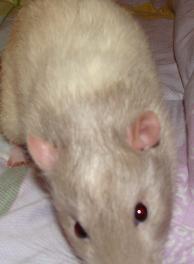 pituitary tumor in male rat?
QuestionQUESTION: Hi, my name is Jennifer and I own a 7
pituitary tumor in male rat?
QuestionQUESTION: Hi, my name is Jennifer and I own a 7
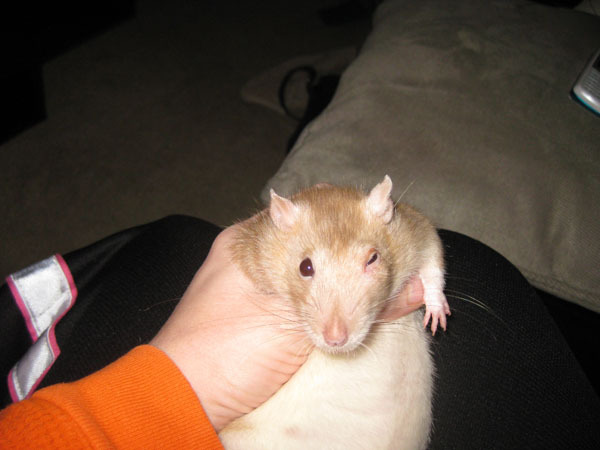 swollen eye, rat
Question
swollen eye, Lain
Hi Sandra,
My rat, Lain, ha
swollen eye, rat
Question
swollen eye, Lain
Hi Sandra,
My rat, Lain, ha
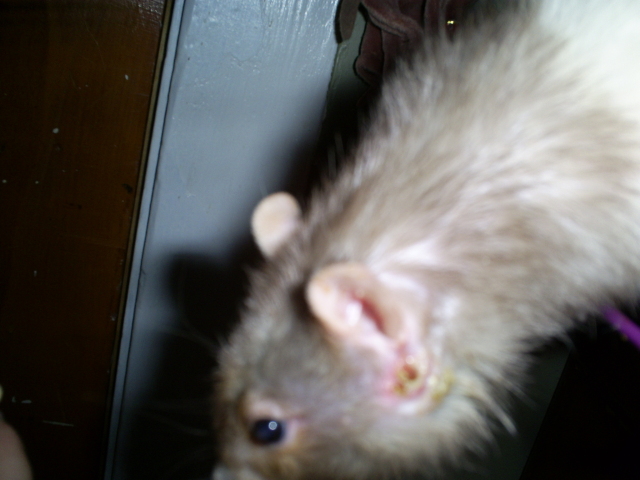 Tooth abcess or other?
QuestionQUESTION: My rats ear kept looking like he scra
Tooth abcess or other?
QuestionQUESTION: My rats ear kept looking like he scra
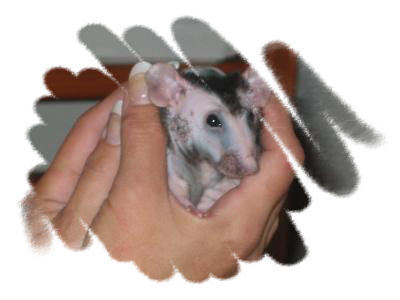 Time to put the rat down?
QuestionQUESTION: Hello Sandra,
I am the one with the r
Time to put the rat down?
QuestionQUESTION: Hello Sandra,
I am the one with the r